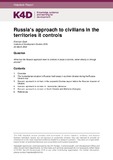| dc.description.abstract | This rapid review synthesises the literature from academic sources, knowledge institutions, non-governmental organisations (NGOs), and trusted independent media outlets on the approach used by the Russian government to provide any support or services to civilians in the territories it controls. The rapid review concludes that Russia provides economic, social, government, and military support to de facto states that it controls, such as Abkhazia, South Ossetia, Transnistria and the Donbas region. Russia covers large parts of the state’s budget of these separatist regions.
This review uses the term aid referring to a wide range of support, such as humanitarian, social safety nets, basic services, infrastructure, state development, and security. Due to the lack of transparency on the Russian aid money that flows into the regions that are the subject of this review, it is impossible to show disaggregated data, but rather a broader overview of Russian aid to these regions.
Russia used humanitarian aid and assistance to provide for civilians. During armed conflict it provided, to some extent, food, and medicines to the people. However, from the literature Russia has used humanitarian aid and assistance as an instrument to pursue broader policy goals that could not be defined as humanitarian in nature. Russia often relied on the language of humanitarianism to strengthen its credentials as a neutral and impartial actor and to justify its continued support for the residents and de facto authorities of Abkhazia, South Ossetia, and Transnistria, to secure its aim to strengthen the political and social ties with these regions while weakening their allegiance to Georgia and Moldova.
As the humanitarian activities to the Donbas region in eastern Ukraine demonstrate, the Russian state is not willing to allow scrutiny of their humanitarian aid by independent organisations. Mistrust, corruption, and the use of aid for propaganda, even smuggling arms into the separatist region, are commonly mentioned by trusted sources. After a conflict becomes more stabilised, Russia’s humanitarian aid becomes more of a long-term strategic “friendship”, often sealed in a treaty to integrate the region into the Russian sphere, such as the cases of South Ossetia, Abkhazia, and Transnistria clearly show. Although all these separatist regions rely on Russia (economically, politically, and through Russia’s military presence), this does not mean that they always do exactly what Russia wants, which is particularly the case for Abkhazia and Transnistria. | en |

